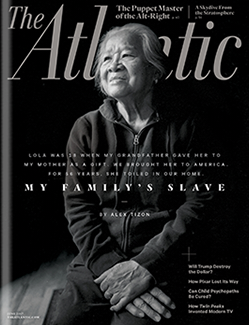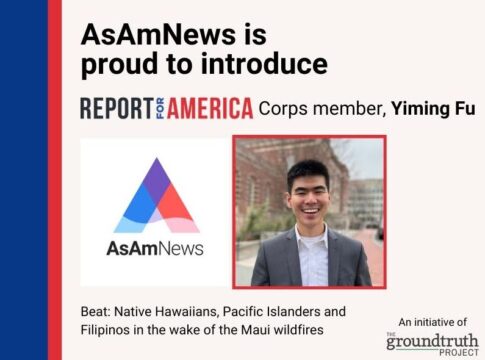By Takuma Okada
AsAmNews Intern
In a country raised with the labor of enslaved people, it is heartbreaking but not surprising to read that even recent immigrant families use slavery to uplift themselves. The late Alex Tizon’s story about Eudocia Tomas Pulido in The Atlantic’s June issue exposes his own family to bring this to light. But the piece has issues; it focuses more on Tizon’s struggle over his family enslaving Pulido than on the woman herself. Lola, the name Tizon’s family gave Pulido as a servant, is used throughout. Overall, it seems like emotional narrative was placed before reporting. In part to address these shortcomings, The Atlantic has compiled a series of responses to the piece from other contributors and readers here.
The series completes a vital but flawed story. Vann R. Newkirk writes in his article that, “the deep power dynamics of slavery are not always clearly articulated.” Sarah Jeong points out that Pulido was Tizon’s mother figure his entire life, and how that emotional connection leads to exploitation of women in traditional family structures. Alice Su reporting from Jordan writes about the immigrant Filipina women there and the lives they lead today, much like Lola’s.
While these responses give much needed information and analysis of My Family’s Slave, the most vital parts of the series are a response from Ai-jen Poo and reactions from readers to the story. Poo writes not only about the women in the U.S. she has met as head of the National Domestic Workers Alliance, but of how these women are trapped.
“Slavery doesn’t just happen in a vacuum, as some perversion from the bigger economic context that people live in. Deep poverty and few options for economic mobility make a person vulnerable to slavery. Language and cultural barriers, and being a woman make a person vulnerable to slavery. Being dependent on an employer for visa access makes a person vulnerable to slavery. Immigration laws that trap a person in the shadows for fear of deportation keep them vulnerable.”
LATEST STORIES
Knowing this, it is important to read the stories survivors sent in. Often, relatives are the abusers, and cut off communication with close family and use documentation as a threat. Others sent in their own experiences of domestic violence and the impact it had on their lives. Horrifyingly, these stories are probably just the beginning. After all, they come from people who managed to educate themselves in what little spare time they had and escape. Language must be a barrier to many, who we may never hear from.
Pulido’s story has helped bring attention to a terrible exploitation of immigrants. There is much work to be done, and thankfully there are organizations listed below that have been fighting for the rights of people like Pulido already that could use your support. In your support though, remember to always listen to and elevate the voices of survivors. As one reader said about #JusticeforEudocia, “For my own situation, finding peace and healing after escaping took precedent over any vengeance or confrontation. I would have hated to become a hashtag.”
- Filipino Migrant Center: Educates and organizes low-income and working class Filipino families
- Gabriela USA: The American branch of the Filipino women’s party fighting for the liberation of oppressed Filipino women
- Migrante: A party committed to advancing the rights and welfare of migrant Filipinos
- National Domestic Workers’ Alliance: Organization working towards increased labor protections for domestic workers
- NAFCON: Dedicated to immigration reform and the need to keep migrant families together
- Philippines Against Child Trafficking: Network of child rights advocates, creating communities that protect children
- Domestic Workers United: Alliance to give power and fair labor standards to domestic workers through organizing
“My Family’s Slave” at The Atlantic
AsAmNews has Asian America in its heart. We’re an all-volunteer effort of dedicated staff and interns. You can show your support by liking our Facebook page at www.facebook.com/asamnews, following us on Twitter, sharing our stories, interning or joining our staff.









RE: My Family’s Slave was Only One of Many: When I read his article all I could think about the whole time was sorrow for this wonderful woman. No matter how he saw her nor how he felt for her can erase what was done to her and the emotional abuse she suffered by the people she lived with. She was denied so much because of all of them. I hope more people read his story and try not to justify or try to empathize with the author. To know that it is done today, I am starting to understand why some don’t like to discuss or face slavery in general. It is an accepted practice in many parts of the world. And when these same people from those countries that accepted misuse and abuse of slaves come to America and cry racism when they get verbally mistreated by ignorance. Double edge sword.